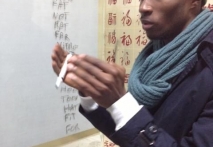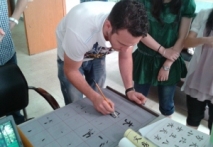Latest News
- Wuxi's Nanchang Street--a historic cultural district that combines classical charm, delicious food, and fun activities
- chinese study
- lastest courses
- Business Assistance/International Consortium of Stem Cell Research
- Foreigner's view of Jiangsu -Changzhou Jintan starts
- estimonials for Our new French Internship student Anais 企业表扬信
- The Double Seventh Festival in China Introduction
- Chinese Proficiency Test (HSK)
- China University Mining and Technology
- Wuxi Library
Students Say
Mandarin Student Zack
Mandarin Education School is a great place to learn Chinese and Chinese Culture.I've learned a lot in this school, my Chine...
Learn Chinese Travel China
If you want to learn Chinese and also discover China, Mandarin Education organize the most funny and cultural study tour.
The...
suzhou Mandarin Jude
I am Jude, I am learning Mandarin in Suzhou Mandarin School,I was learning in Wuxi Mandarin Education too.I like my Chinse Teacher...
chinese class
Improve your reading, speaking and your writing by experiencing our teaching methods,Offer free student Visa.
...
Wuxi Mandarin Jessie
I've learned Chinese for almost 8 years, I can understand what Chinese people say,but when I speak, I feel very uncomfor...
Chinese Internship or Jobs
You are looking for a professional experience abroad? Get the opportunity to discover the Chinese business,Look for an ...
Mandarinedu Student Florent
I love my Wuxi Mandarin Education School. It is the EASY MANDARIN Learning way, I am learning faster than I wanted.My teach...
Mandarin E Learning
Mandarin Education School offers you Online Chinese Courses. It has never been so easier to have Chinese courses ...
Mandarin Student Brad
I am studying Chinese in Mandarin Education School. I can speak quit good Chinese and talk to Chinese people by myself. Thank...
Wuxi Mandarin edu. Student Jennifer
I love learning Chinese in Mandarin Education School.That's a great place to learn and make friends.
...
Add Our School Official
to get more informations

0086 1866 1199 988
0086 510-81151808
Sandy.Swun
519988808
Mandarin Education School
Room 405, 4 Fl,Building No.8,
Maoye Business Center,
Chang jiang No.1,
New district , Wuxi City , China
我们在解释这两个词组前,我们先来看一下两个词组的不同部分,即“下”和“会”的意思。然后我们根据这两个词的不同意思,基本可以判断出这两个词组的不同处。
Before we explain the two phrases, let's look at the different parts of the two phrases, meaning "under" and "will". Then we can judge the difference between the two phrases according to the different meanings of the two words.
우리는 이 두 구절을 설명하기전에 먼저 두 구절의 부동한 부분 즉 "하"와" 회"의 뜻을 보기로 하자. 그리고 우리는 이 두 단어의 부동한 뜻에 근거하여 기본적으로 이 두 단어의 부동한 점을 판단할수 있다.
“下”的基本意思是表示位于地平线下面的事物。 后来,“下”表示相对于一个参考物而言的位置。 当一个动作发生的时候,动作是从上而下的过程,我们往往为了强调动作的方向,在动词后面加上“下”。 比如: “打一下”、“试一下”。久而久之,“下”成为表示动作方向和次数的量词。 那么,当我们用“打一下”的时候,意思是手只能从上到下打“运动”一次。“下”,表示从上到下的过程。那么这个过程的长短,就是“一下”完成的时间。 所以,我们为了强调动作可以很快完成,就用“V+一下”这个结构。
The basic meaning of "below" is to mean something below the horizon. Later, the "lower" indicates the position relative to a reference. When an action occurs, the action is a top-down process. We often add "down" after the verb in order to emphasize the direction of the action. For example: "hit", "try". Over time, "under" becomes a quantifier to indicate the direction and number of actions. So, when we use "hit", it means that the hand can only hit "movement" once from top to bottom. "down", the process from top to bottom. Then the duration of this process is the time of completion. So, to emphasize that the action can be done quickly, we use the V-down structure.
"하"는 지평선 아래에 있는 사물을 의미한다. 후에 "하"는 하나의 참고물에 대한 위치를 표시한다. 한 동작이 발생할 때 동작은 우로부터 아래로 향하는 과정으로서 우리는 흔히 동작의 방향을 강조하기 위해 동사 뒤에 "하"를 첨가한다. 례를 들면 "한번 해보자"," 한번 해보자". 오랜 시간이 흐르면서 "하"는 동작의 방향과 차수를 나타내는 척도로 되였다. 그럼 우리가 "때리기"를 할 때, 손은 위에서부터 아래로 한 번 쳐야 한다는 뜻이다. "하"는 우로부터 아래에 이르는 과정을 표시한다.그럼 이 과정의 길이가 바로 "단번에 완성한 시간"이다. 그러므로 우리는 동작이 빨리 완성될수 있다는것을 강조하기 위하여 "V+"구조를 사용한다.
我们再来看看“会”。 “会”是一个会意字。基本意思是人与人见面,看到对方的意思。在久远的时代,人们见面所需要的时间很短,可以几句话就交流完成了。所以,逐渐的“会”成为了表示时间很短的量词、名词。 “一会儿”往往表示时间很短。 强调时间的长度。如果我们说“等一会”,表示说话的人强调“等”的时间很短,可能就是10秒钟。
Let's take another look at "yes". "will" is a word of understanding. The basic meaning is that people meet people, see the meaning of the other party. In a long time ago, it took a short time for people to meet, and the communication was completed in a few words. Therefore, the gradual "will" has become a very short time quantifier, nouns. "A moment" often means a short time. Emphasize the length of time. If we say "wait a minute," the speaker stresses "wait" for a short time, probably 10 seconds.
우리는 다시 "회"를 보기로 하자. "회"는 회의자이다. 기본적으로 사람은 사람을 만나고 상대방은 본다는 뜻이다. 오래된 시대에, 사람들이 만나는 데 필요한 시간이 매우 짧아서 몇 마디만 할 수 있으면 바로 교류할 수 있다. 그리하여 점차 "회"는 시간이 아주 짧음을 나타내는 량어, 명사로 되였다. "잠시"는 흔히 시간이 매우 짧음을 표시한다. 시간의 길이를 강조하다. "잠깐만 기다리자"고 하면" 기다리라"고 강조하는 시간이 10초가량 걸릴 수도 있다.
有的时候,我们可以“等一下”、“等一会”通用。但是,有的时候,根据我们强调的对象不同,我们可能会用不同的词。 比如,我和我们的同事到我们家,我想换一下睡衣,然后出来招呼她。这时,我可能更喜欢用“等一下”,想向我的同事强调这个“等”的动作,可以很快完成。给他一种暗示,这个动作可以很快、很容易完成。 但是,如果我需要上厕所,我可能会用“等一会”。我用这个词,其实是暗示我的同事,时间不长,但是我需要一定的时间。如果用别的词,他可能会觉得时间长。如果我用“等一会”,他会理解为需要等待,但是好在时间不是很长,可以接受。
Sometimes we can wait and wait. But sometimes, depending on the object we emphasize, we may use different words. For example, I come to our house with our colleague, I want to change my pajamas and come out to greet her. At this point, I may prefer to use "wait a minute," want to stress the "wait" to my colleagues, can be done quickly. Give him a hint that the action can be done quickly and easily. But if I need to go to the bathroom, I might use "wait a minute." I use this word to imply that my colleagues, not long, but I need a certain amount of time. If he uses another word, he may think it takes a long time. If I use "wait a moment," he will understand the need to wait, but the good thing is that the time is not very long to accept.
어떤 때는 "잠시만"," 잠시만"이 통용될수 있다. 하지만 때로는 우리가 강조하는 대상에 따라 다른 단어를 사용하기도 합니다. 예를들어 나와 우리 동료는 우리 집에 와서 잠옷을 갈아입고 와서 인사하고 싶다. 이때 나는 "잠깐만"을 더 좋아하여 나의 동료들에게 이" 등"을 강조하고 싶은 동작을 재빨리 완수할수 있었다. 그에게 이 동작은 아주 빠르고 쉽게 완성할 수 있다는 암시를 주었다.하지만 만약 내가 화장실에 가야 한다면, 나는 아마 "잠깐"을 사용할 것이다. 내가 이 단어를 쓴 것은 사실 나의 동료가 시간이 얼마 남지 않았음을 암시하는 것이지만, 나는 일정한 시간이 필요하다. 만약 다른 단어를 쓴다면 그는 아마도 시간이 길다고 느낄 것이다. 만약 내가 "잠시만 기다리자"고 썼다면 그는 기다리는것이 필요하다고 리해했을것이다. 그러나 시간이 길지 않아 접수할수 있었다.










